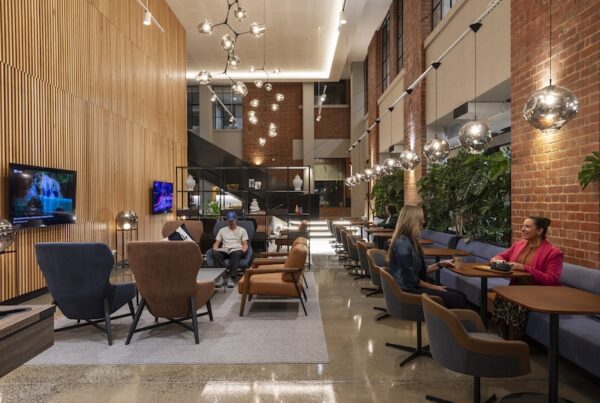
As businesses and individuals become increasingly conscious of their environmental impact, coworking spaces are emerging as a sustainable alternative to traditional offices. Beyond being a flexible solution for businesses, coworking spaces contribute to a greener, more efficient workplace model that reduces waste, cuts energy consumption, and minimizes commuting emissions. By rethinking how and where we work, we can make a positive impact on the planet. In this article, United Co. explores how coworking spaces support sustainability and why they’re a valuable choice for environmentally-minded professionals and companies.
What is Coworking Sustainability?
Coworking sustainability refers to the environmentally conscious approach that coworking spaces adopt to minimize their ecological footprint and create greener work environments. At its core, coworking sustainability leverages the concept of shared resources and facilities to reduce waste, energy consumption, and the overall demand for materials. Rather than each individual or company maintaining separate office spaces, coworking spaces provide a communal setup where members share amenities like meeting rooms, printers, and kitchen areas. This pooling of resources prevents redundancy, decreases the consumption of office supplies, and limits the environmental impact of maintaining separate offices for each business.
Moreover, coworking sustainability goes beyond just shared resources. Many coworking spaces are designed with eco-friendly materials, energy-efficient lighting, and ventilation systems, helping reduce energy consumption. Smart technologies, such as automated lighting and climate control systems, adjust based on occupancy, ensuring that energy is not wasted when areas are unoccupied. This emphasis on sustainable design and operations aligns coworking spaces with the growing demand for eco-friendly business practices, appealing to companies and individuals who prioritize environmental responsibility in their workspaces.
By promoting coworking sustainability, these spaces enable professionals and businesses to operate in a way that’s more resource-efficient and eco-conscious, supporting sustainability goals and helping reduce their carbon footprint in a significant way.
Environmental Benefits of Coworking Sustainability
1. Shared Resources
One of the most significant environmental benefits of coworking spaces is resource sharing. In traditional office setups, each company or individual typically maintains separate facilities, including printers, meeting rooms, kitchens, and office equipment. This duplication of resources leads to increased waste, higher energy consumption, and more equipment that ultimately ends up in landfills.
Coworking spaces eliminate this redundancy by providing shared facilities that meet the needs of all members. For example, a single high-quality printer in a coworking space can serve dozens of members, reducing the need for multiple machines. Shared meeting rooms, kitchens, and communal areas also mean fewer resources are required to accommodate everyone, ultimately reducing waste and promoting a culture of efficiency.
2. Energy Efficiency
Coworking spaces are often designed with energy efficiency in mind, featuring LED lighting, energy-saving appliances, and smart temperature control systems. By optimizing energy use, coworking spaces reduce electricity consumption compared to the combined energy output of individual offices.
Many coworking spaces also implement smart technologies that automatically adjust lighting and temperature based on occupancy, minimizing energy waste. These environmentally conscious designs allow coworking spaces to maintain comfortable working conditions while conserving energy, contributing to a smaller carbon footprint.
3. Reduction of Commuting Emissions
Another major benefit of coworking spaces is the reduction of commuting emissions. Traditional offices often require employees to commute daily to centralized locations, contributing to greenhouse gas emissions from transportation. In contrast, coworking spaces are frequently located in various neighborhoods, giving professionals the option to choose a workspace closer to home.
By reducing the need for long commutes, coworking spaces help lower carbon emissions and decrease traffic congestion. Additionally, coworking spaces support remote and hybrid work models, which allow professionals to work part-time from home and reduce commuting frequency. This flexibility not only benefits the environment but also enhances the work-life balance for employees.
4. Sustainable Design Elements
Many coworking spaces incorporate sustainable design elements, including green building practices, natural lighting, and indoor plants. Using sustainable materials and energy-efficient appliances reduces the environmental impact associated with construction and daily operations.
Natural lighting, for instance, not only cuts down on electricity usage but also improves the well-being of workspace members by providing a more pleasant and productive environment. Indoor plants are another sustainable addition commonly found in coworking spaces, as they improve air quality and add a refreshing touch of nature to the office. By prioritizing sustainable design, coworking spaces create eco-friendly environments that benefit both people and the planet.
The Broader Impact of Coworking Sustainability
Coworking sustainability extends beyond the immediate environmental benefits and has a positive impact on local communities, corporate sustainability goals, and workplace culture. Here’s a closer look at how coworking spaces contribute to a more sustainable world on a larger scale:
1. Impact on Local Communities
Coworking spaces are often located in diverse neighborhoods rather than confined to centralized business districts. This proximity to residential areas encourages professionals to work closer to home, reducing the need for long commutes and, consequently, commuting-related emissions. By attracting businesses, freelancers, and remote workers to local neighborhoods, coworking spaces contribute to local economic development. Cafes, restaurants, and shops near coworking spaces benefit from the increased foot traffic, fostering vibrant local economies. This local focus not only benefits the community financially but also helps to create walkable, sustainable neighborhoods that reduce reliance on vehicles.
2. Role in Driving Corporate Sustainability Goals
For businesses with Environmental, Social, and Governance (ESG) commitments, coworking spaces present an ideal opportunity to align with sustainability goals. By operating in coworking spaces, companies can significantly reduce their carbon footprint, as these spaces are inherently more energy-efficient and resource-conscious. This alignment allows businesses to contribute to their sustainability initiatives without the need to overhaul their existing infrastructure or invest heavily in eco-friendly upgrades.
Furthermore, coworking spaces allow companies to showcase their commitment to environmental responsibility, which is increasingly important for attracting clients, partners, and employees who prioritize sustainability. Operating from a coworking space that emphasizes sustainability enhances the company’s brand reputation and sends a clear message about its values, ultimately strengthening corporate social responsibility efforts and increasing stakeholder trust.
3. Inspiration for Sustainable Work Culture
Coworking spaces are designed with sustainability in mind, and this focus on eco-friendly practices often inspires members to adopt greener habits in their work routines. For example, coworking spaces frequently promote recycling programs, encourage the use of reusable items, and provide eco-friendly alternatives to traditional office supplies. Exposure to such practices can foster an eco-conscious mindset among members, encouraging them to bring these values into their business operations.
Additionally, the collaborative nature of coworking spaces allows members to share ideas, discuss sustainable practices, and inspire one another to find creative ways to reduce their environmental impact. Over time, this exposure to sustainability in coworking environments can influence companies to integrate more sustainable practices into their operations, such as reducing paper usage, minimizing energy consumption, and promoting flexible work schedules to reduce commuting.
Read More About How to Reduce Waste in the Workplace: Practical Tips for a Greener Office
Coworking spaces are not only flexible and collaborative work environments but also play a significant role in supporting sustainability. Through shared resources, energy-efficient designs, and the reduction of commuting emissions, coworking spaces minimize environmental impact and promote eco-friendly practices. This sustainable approach is particularly appealing to professionals and companies looking to reduce their carbon footprint and align their workspace choices with their values.
By choosing a coworking space, you can contribute to a greener future while enjoying the many benefits of a collaborative and inspiring workspace. Embrace coworking sustainability and join the movement towards a more eco-conscious way of working.
Ready to experience the benefits of a sustainable, community-focused workspace? At United Co., we offer flexible coworking options designed to support productivity, collaboration, and environmental responsibility. Book a tour today and discover how our eco-friendly facilities and shared workspaces can help your business thrive while contributing to a greener future.





